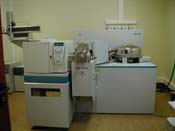 |
| Unified Food Inspection Body (EFET), NCSR "Demokritos" |
28/02/2006
A multi-annual programme of inspecting dioxin and polychlorine biphenyl
(PCBs) levels in food of both Greek and foreign origin, has been
conducted since 2002 by the Unified Food Inspection Body (EFET), in
cooperation with the NCSR "Demokritos" Laboratory for Mass Spectrometry
and Dioxin Analysis.
As stated in a recent announcement by the Unified Food Inspection Body,
the inspection mainly concerns food of animal origin, such as meat and
its products, milk and dairy products, eggs, fish as well as baby foods,
fruits and vegetables, olive oil and cereals. All samples tested were
found to be in accordance with legislation (Regulation 2375/2001), while
the dioxin content of foods originating from Greece was much lower than
the maximum allowable limits and the European average.
Regarding the subject of animal feed contaminated with dioxin from
Belgium, the Unified Food Inspection Body announced that it is being
kept up to date on a regular basis from the Rapid Alert System for Food
and Feed (RASFF), while being in communication with both the European
Union and the competent authorities of Belgium and Holland. Further it
has requested in writing, additional data on the possible dioxin
contamination of food from farm units of the above countries that used
that particular animal feed. It is evident from data available today
that there is no public health risk.
It is worth noting that during the recent inter-laboratory dioxin test
that was conducted by UKAS, the official accreditation body of England,
with the participation of internationally acknowledged laboratories that
specialize in dioxin analysis, the Mass Spectrometry and Dioxin Analysis
Laboratory of NSCR ?Demokritos? was closer to the result (deviation = 0)
from all participating laboratories. This distinction places the Mass
Spectrometry and Dioxin Analysis Laboratory among the most reliable
dioxin laboratories in the world.
The Mass Spectrometry and Dioxin Analysis Laboratory is a high
technology unit that has been operating since 2002, servicing healthcare
and consumer protection. The laboratory features modern premises that
meet all safety standards, experienced scientific staff and specialised
equipment, allowing it to isolate and determine in detail dioxins, PCBs
and similar compounds in several types of samples (e.g. foods,
biological substances and animal feed) and, in general, determine
substances in traces.
The Mass Spectrometry and Dioxin Analysis Laboratory is already in
collaboration with the Unified Food Inspection Body and Veterinarian
Health Department of the Ministry of Agriculture, in order to determine
dioxins and similar compounds (PCBs) in food, nutrition supplements and
animal feed. They have also carried out dioxin and PCB analyses on human
serum for the Ministry of National Economy, Hellenic Postal Offices,
Public Power Corporation, while consulting private food enterprises on
quality assurance matters.

 News-Events
News-Events
 R&D News
R&D News

